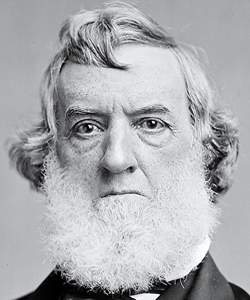Gideon Welles, As Journalist (American National Biography)
Scholarship
In 1825 [Gideon] Welles became acquainted with John M. Niles, editor and proprietor of the Hartford Times and Weekly Advertizer, who espoused Andrew Jackson as the coming political figure in the nation. His opinion on states' rights, banking corporations, free trade, and hard money appealed to Welles, who joined Niles's publishing venture and soon gained a reputation for his support of Jackson and his attacks on the John Quincy Adams administration…
Under pen names Welles wrote editorials or public letters for such journals as the New York Evening Post and the antislavery National Era in Washington. An opponent of the Compromise of 1850, he denounced the Fugitive Slave Act in the compromise on constitutional, political, and moral grounds. Nevertheless, he supported Franklin Pierce, the Democratic party nominee in 1852, and hoped that Pierce, if elected, would not adhere strictly to the party platform that accepted the compromise. As president, Pierce did not oppose the expansion of slavery. When the Kansas-Nebraska Act of 1854 threw the territories open to popular sovereignty and the Hartford Times along with the Democratic organization in the state supported that legislation, Welles and Niles broke with the party and the paper and joined the new Republican party.
To give wider currency to the new party, Welles and Niles established the Hartford Evening Press. Welles became its first editor. He also ran for governor of the state on the Republican ticket in 1856 but was defeated.
Under pen names Welles wrote editorials or public letters for such journals as the New York Evening Post and the antislavery National Era in Washington. An opponent of the Compromise of 1850, he denounced the Fugitive Slave Act in the compromise on constitutional, political, and moral grounds. Nevertheless, he supported Franklin Pierce, the Democratic party nominee in 1852, and hoped that Pierce, if elected, would not adhere strictly to the party platform that accepted the compromise. As president, Pierce did not oppose the expansion of slavery. When the Kansas-Nebraska Act of 1854 threw the territories open to popular sovereignty and the Hartford Times along with the Democratic organization in the state supported that legislation, Welles and Niles broke with the party and the paper and joined the new Republican party.
To give wider currency to the new party, Welles and Niles established the Hartford Evening Press. Welles became its first editor. He also ran for governor of the state on the Republican ticket in 1856 but was defeated.
John Niven, "Welles, Gideon," American National Biography Online, February 2000, http://www.anb.org/articles/05/05-00825.html.
Gideon Welles, Legacy (American National Biography)
Scholarship
By the war's end Welles had been primarily responsible for building a navy second only to that of Great Britain. He had also reorganized the department, improved significantly contract administration, and established an academy of science, the forerunner of all government-sponsored research agencies.
As a cabinet member, Welles gave complete support and loyalty to Lincoln on broad policy measures. He retained, however, much of his Democratic political views. Though he backed emancipation, he was decidedly conservative on extending full civil rights to the former slaves. An ardent believer in states' rights, he insisted such legislation must be left to the states. His views on Reconstruction were similar to those of Andrew Johnson. Welles consulted on many of Johnson's veto messages and consistently approved of his stand against Congressional Reconstruction.
As a cabinet member, Welles gave complete support and loyalty to Lincoln on broad policy measures. He retained, however, much of his Democratic political views. Though he backed emancipation, he was decidedly conservative on extending full civil rights to the former slaves. An ardent believer in states' rights, he insisted such legislation must be left to the states. His views on Reconstruction were similar to those of Andrew Johnson. Welles consulted on many of Johnson's veto messages and consistently approved of his stand against Congressional Reconstruction.
John Niven, "Welles, Gideon," American National Biography Online, February 2000, http://www.anb.org/articles/05/05-00825.html.




